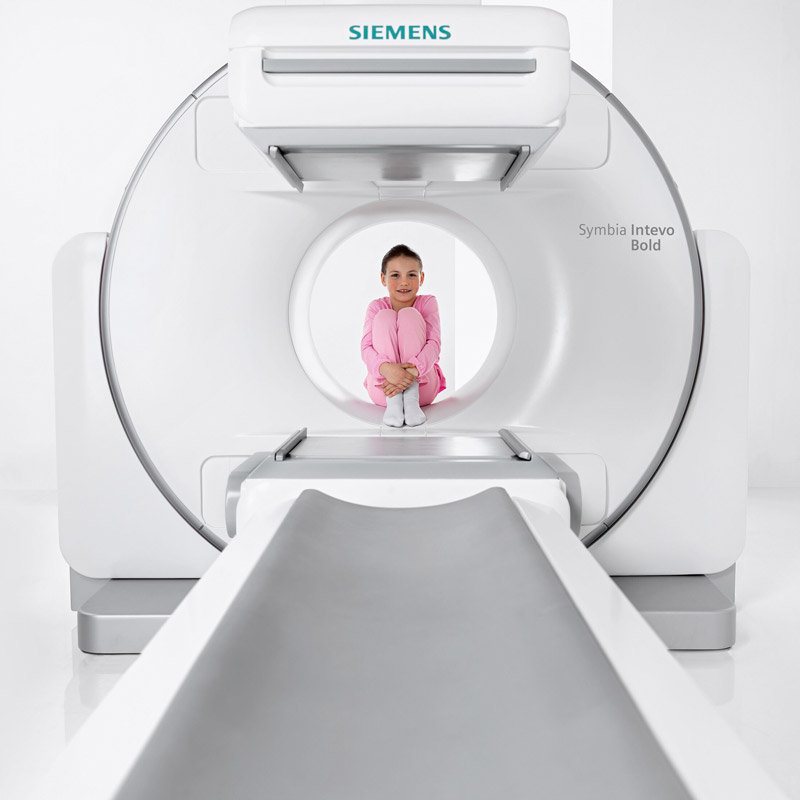Nuclear Medicine
Nuclear medicine is a medical imaging specialty that uses small amounts of radioactive medication, called a radiopharmaceutical (tracer) to diagnose a variety of diseases, including musculoskeletal injuries and pain, cancers, heart disease, gastrointestinal, endocrine, neurological disorders and other abnormalities within the body.


What is a Nuclear Medicine scan?
Nuclear medicine is a medical imaging specialty that uses small amounts of radioactive medication, called a radiopharmaceutical (tracer) to diagnose a variety of diseases, including musculoskeletal injuries and pain, cancers, heart disease, gastrointestinal, endocrine, neurological disorders and other abnormalities within the body.
Nuclear medicine procedures are able to identify disease in its earliest stages as well as a patient’s immediate response to therapeutic interventions and often complement other investigations and imaging studies.
The radiopharmaceutical makes the body slightly radioactive for a short time. The SPECT-CT scanner detects the radiation, which is emitted from the body, and takes images of how the inside of the body is functioning. This radiopharmaceutical (tracer) is usually given to you by a small intravenous injection. Only a very small amount of radiopharmaceutical is given to keep the radiation dose to a minimum.
There are no commonly documented side effects from any nuclear medicine procedures. These tracers are different to the contrast used when having a CT scan.
Nuclear medicine tests are very sensitive, often showing up abnormalities before an X-Ray or ultrasound would.
Beyond Radiology has the latest technologically advanced SPECT-CT scanner that provides high quality imaging while using ultra low dose protocols.
What preparation is required?
Some nuclear medicine procedures require special preparation. Our booking coordinators will inform you of the required preparation for your procedure at the time of booking.
Most radiopharmaceuticals are passed through breast milk. If you are breastfeeding, please notify our technical staff, who will advise you of any necessary precautions. These precautions usually involve expressing and discarding breastmilk for several hours after your scan.
Most nuclear medicine studies should not be performed during pregnancy.
What can I expect during a SPECT-CT scan?
SPECT-CT imaging procedures are non-invasive and are usually painless.
Metal objects such as jewellery and coins, need to be removed prior to the scan as they can be detected on the CT images and may affect image quality.
You may be provided with a gown to wear instead of your own clothes, as some materials can be seen on the CT scan.
You will be asked to lie flat on a long table that will move through the opening of the SPECT-CT scanner. You will be asked to remain still during the scan.
Depending on the type of nuclear medicine examination performed, you may have images taken at the time of injection as well as 2-3 hours after the injection.
How long will the SPECT-CT scan take?
There are many different nuclear medicine scans and procedures. The most commonly performed nuclear medicine examinations are bone scans. These require a visit in the morning for an injection and possibly some imaging, followed by another visit several hours later in the day for more imaging.
The images will usually take 10 minutes at the time of injection and 30-60 minutes when you return depending on the body area of being imaged. The booking coordinators will give you an approximate duration of your procedure at the time of booking.
What is the radiation dose?
The radioactive tracer that we use begins to disappear as soon as it is administered. Most are undetectable within 24-48 hours. The total radiation dose to the body is approximately the same as having a CT scan.
The SPECT-CT scanner at Beyond Radiology uses the latest advanced low radiation dose technology to optimise scanning techniques.
How much will the SPECT-CT scan cost?
Our booking coordinators will advise you of all costs involved with your SPECT-CT scan prior to your scan.
When can I expect my results?
The images obtained from your SPECT-CT scan are recorded digitally and stored on our system.
The images will be available electronically to your referrer immediately after the SPECT-CT scan has been completed by the nuclear medicine technologists.
The images from the scan will then be interpreted by a subspecialist Radiologist who will report the scan then send an authorised report electronically to your referrer.
What will happen if I am pregnant?
If you are pregnant or think you may be pregnant, please inform the booking coordinators at the time of booking your appointment. The need for the scan will be discussed with the Radiologist.
Book an appointment
It’s easy to book your appointment with us online. Whether you’re a referrer scheduling a visit on someone’s behalf, or you’re a patient with one of our Beyond Radiology forms, simply click ‘Book an appointment’ to start the process.
